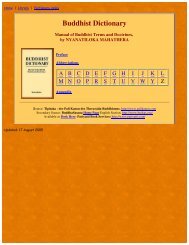The Three Basic Facts of Existence II: Suffering (Dukkha) - Buddhist ...
The Three Basic Facts of Existence II: Suffering (Dukkha) - Buddhist ...
The Three Basic Facts of Existence II: Suffering (Dukkha) - Buddhist ...
- No tags were found...
You also want an ePaper? Increase the reach of your titles
YUMPU automatically turns print PDFs into web optimized ePapers that Google loves.
dogmas continues and is reflected in the spiritual wasteland that many people are living in,particularly the youth <strong>of</strong> today.<strong>The</strong> Buddha undoubtedly went through a period <strong>of</strong> wondering, as we all do. That he waswell acquainted with every shade <strong>of</strong> religious and philosophical thought we know from theBrahmajāla Sutta which outlines them all—some sixty-two theories. <strong>The</strong> dominant religion <strong>of</strong>Brahmanism he discarded outright for the reason that it too perishes on the rock <strong>of</strong> dukkha.<strong>The</strong> Bhūridatta Jātaka No. 543, attributes these words to the Buddha on the subject <strong>of</strong>Brahma:He who has eyes can see the sickening sight;why does not Brahma set his creatures right?If his wide power no limit can restrain,why is his hand so rarely spread to bless?Why are his creatures all condemned to pain?Why does he not give happiness to all?Why do fraud, lies, and ignorance prevail?I count your Brahma one-among the unjust,Who made the world in which to shelter wrong.<strong>The</strong> Buddha was adamant in his opposition to all kinds <strong>of</strong> metaphysical speculation, regardingit futile, calling such questions “the jungle, the desert, the puppet show, the writhing, theentanglement <strong>of</strong> speculation” (Dialogues <strong>II</strong>). He cared nothing about ritual or worship ormetaphysics. He was not only non-theological but antitheological. Sir Edwin Arnoldsummarises this attitude when he makes the Buddha say:Measure not with wordthe immeasurable;Nor sink the string <strong>of</strong> thoughtinto the Fathomless.” 46How wise the Buddha was we are better able to appreciate now, some 2511 years later, and canonly mourn for the many men who wasted so much time and energy, even to the extent <strong>of</strong>laying down their lives in defence <strong>of</strong> absurdities. Mankind is very slow in learning and realisingthat a negative is also an affirmative. <strong>The</strong> Buddha negated that saintliness and contentment layin knowledge <strong>of</strong> God and the origin <strong>of</strong> the universe, and affirmed that these desirable states <strong>of</strong>mind were simply the result <strong>of</strong> selfless and beneficent living. <strong>The</strong> Buddha was a naturallylogical thinker, and although it has been greatly s<strong>of</strong>t-pedalled by many <strong>of</strong> the commentators, agreat intellectual. In his reflections he came to realise that the inbuilt desire to know was not themajor urge within the human being. <strong>The</strong> greatest inbuilt urge in man is the drive for the pursuit<strong>of</strong> happiness. His desire to know is only a part <strong>of</strong> this greatest urge. <strong>The</strong>refore he concentratedon the greatest, thereby putting first things first. As he himself has said time and time again,“One thing and only one thing do I teach, dukkha and the end <strong>of</strong> dukkha.” He had realised thatall the metaphysical speculations were <strong>of</strong> no help whatsoever in the search for happiness andthe avoidance <strong>of</strong> pain. In many <strong>of</strong> the articles written by <strong>Buddhist</strong> writers we are warned aboutthinking in concepts. However, they never come quite clean, they do not give any practicalexamples <strong>of</strong> what these concepts to be avoided are. In actual fact, these concepts are thateverything must have a beginning. <strong>The</strong> concept in this case is the concept <strong>of</strong> First Cause or Godthe Creator, and the concepts that arise in dependence on this one.<strong>The</strong> Buddha was nonetheless a realist. He accepted the fact that every human being isprimarily concerned with what he considers to be conducive to his own interest and well-being.46Sir Edwin Arnold Light <strong>of</strong> Asia.27
















